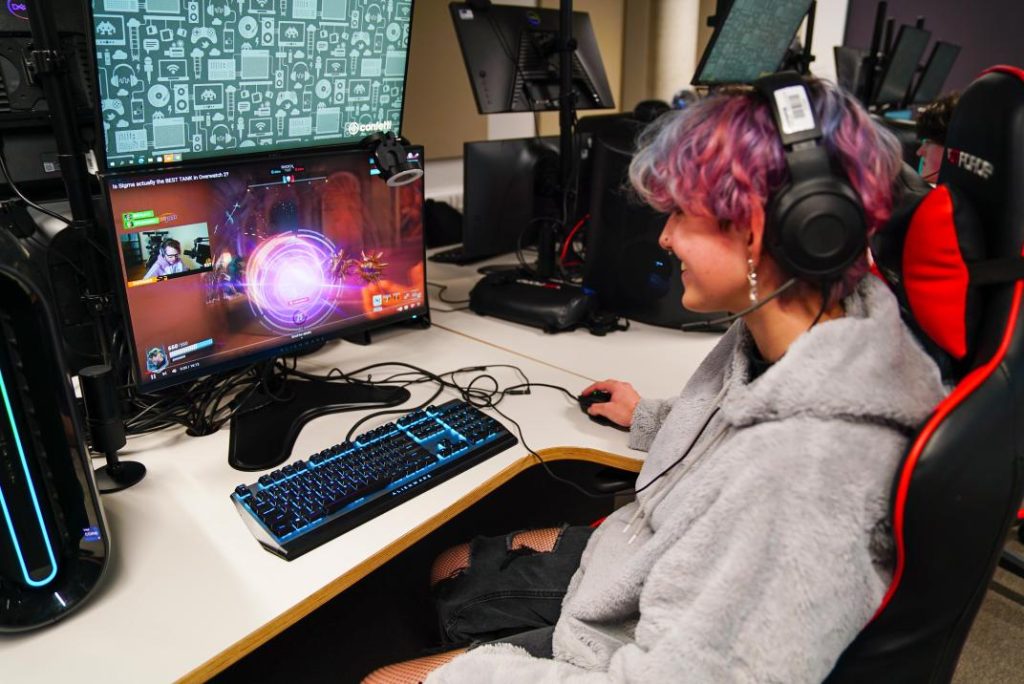James Fraser-Murison, ESI’s Esports Education Advisor, weighs up the pros and cons of esports degrees in this column for Esports Insider ahead of ESI Next Gen 2024.

In recent years, the landscape of higher education has witnessed a fascinating addition: esports degrees. These programmes, tailored to meet the demands of the fluctuating esports industry, offer students a unique pathway into the world of the $1.5bn (~£1.2bn) esport industry. Some with unique units on shoutcasting, video production and editing, whilst others touch various components in conjunction with a more ‘traditional’ degree.
Currently in the UK, there are five outright esports degrees (Falmouth, Staffordshire, UCFB, Chichester and Northampton), with several other universities offering a more tailored approach like the College of Esports (Esports Coaching and Management (BA)), International Esports Business (BA), Sheffield Hallam (Esports Management BA) and the University of Sunderland (Esports Event Management (BSc)).
However, like any emerging field, esports degrees come with their own set of opportunities and challenges. In this article, we’ll delve into the positive and negative aspects of pursuing esports degrees in the UK, and conclude with a speculative thought about the future of esports education on a global scale.
Positive aspects
Esports has evolved from a niche pastime to a global phenomenon, boasting millions of enthusiasts and generating billions in revenue. With this exponential growth has come an increased demand for skilled professionals to manage teams, organise events and drive marketing strategies within the industry. Esports degrees cater to this demand by providing students with specialised knowledge and practical experience, thereby enhancing their employability in a competitive job market.
Another positive is that many esports degree programmes look to offer hands-on learning experiences in areas such as tournament organisation, team management and content creation. These practical opportunities not only deepen students’ understanding of the industry but also allow them to hone essential skills such as teamwork, leadership, and project management; all essential skills identified by the World Economic Forum. Moreover, working closely with industry professionals provides valuable networking opportunities that can lead to internships or job offers upon graduation — or at least that’s the plan anyway.
Additionally, esports degrees often integrate elements of technology, business, marketing and psychology, offering students a comprehensive understanding of the multifaceted nature of the gaming industry. This interdisciplinary approach equips graduates with a diverse skill set that is transferable across various sectors outside esports, opening up a wide range of career opportunities beyond traditional gaming roles. With a billion tech jobs needed by 2030, some of the jobs will clearly be filled by those coming from within this background.
The dynamic nature of the esports industry encourages innovation and entrepreneurship in a sector that shows growth and opportunities across multiple career paths — and these traits can be nurtured within esports degree programmes. Students are encouraged to think creatively, develop new ideas, and explore emerging trends, laying the groundwork for future innovations within the industry.
Esports qualifications and portfolios forged within the right course, will allow students to demonstrate effective skills in say video production, video editing or stage set up, such as the Esports Production course offered by the Confetti Institute, which in turn can be used to apply for more traditional roles in the creative media industry, particularly in television and film where the UK is continuing to make heavy investment.

Negative aspects
Despite the rapid growth of the esports industry, there remains a degree of scepticism surrounding the academic credibility of esports degrees. Critics argue that esports, as a field of study, may not command the same level of respect or recognition as more traditional disciplines. This perception can deter prospective students from pursuing esports degrees and may also create challenges when seeking employment outside of the gaming industry. Many will (and have) argue that without a specialised lecturer from an esports background, traditional teachers can’t offer the same support and guidance as those from the industry itself. Equally, given the sector’s young age, many industry personnel may lack the necessary academic background to adequately teach at degree level.
There’s also concern around the lack of opportunities. Despite the money, prize rewards and potential often linked with the esports industry, the current ‘esports winter’ and well-documented job loses at Riot, Epic and Ubisoft, (and many more), and emergence of AI, there is the real risk students are paying their tuition fees for jobs that the industry doesn’t need or can’t sustain longer term.
Moreover, unlike established fields such as business or engineering, esports lacks true standardised educational requirements and professional certifications. This lack of industry standards can lead to uncertainty for graduates of esports degree programs, as employers may vary in their expectations and preferences when hiring within the esports or gaming industry. Additionally, the absence of clear pathways for professional development and advancement may hinder the long-term career prospects of esports professionals.
Finally, while esports degrees offer specialised training in esports-related job fields, some critics argue that they may lack the breadth and depth of traditional degree programmes. Students who choose to pursue esports degrees may miss out on exposure to other disciplines and industries, potentially limiting their career options outside of the gaming sector. This narrow specialisation could also pose challenges for individuals seeking to pivot or transition to different career paths later in their professional lives.

Future of Esports Education
As we look ahead to the future of esports education, it’s clear that the trajectory of these programmes will be shaped by both internal and external factors. On one hand, the continued growth of esports courses within education and maturation of the esports industry are likely to fuel demand for specialised education and training opportunities. After all, there’s no sign of the education sector slowing down anytime soon. As esports becomes increasingly integrated into mainstream culture, the stigma surrounding gaming-related degrees may diminish, leading to greater acceptance and recognition within academic and professional circles.
Moreover, advancements in technology, such as virtual reality (VR) and augmented reality (AR), could potentially advance the way esports is taught and experienced. Imagine a future where students can participate in virtual tournaments, analyse gameplay using immersive VR simulations, and collaborate with teammates and instructors from around the world in real-time. These innovations have the potential to enhance the educational experience and further blur the lines between traditional sports and esports.
On the other hand, the rapid evolution of the esports industry presents ongoing challenges for educators and institutions seeking to stay ahead of the curve. As new games, platforms and business models emerge, esports degree programmes must remain flexible and adaptable, continually updating their curriculum to reflect the latest trends and developments. Collaboration between academia, industry stakeholders and professional organisations will be crucial in ensuring that esports education remains relevant and effective in preparing students for careers in this dynamic field.
In conclusion, while esports degrees in the UK offer exciting opportunities for students passionate about the industry, they also face challenges related to credibility, industry standards, and employment opportunities. However, with the right approach and ongoing collaboration between academia and industry, esports degrees could prove a valuable resource to help grow and professionalise the industry on a global scale.
